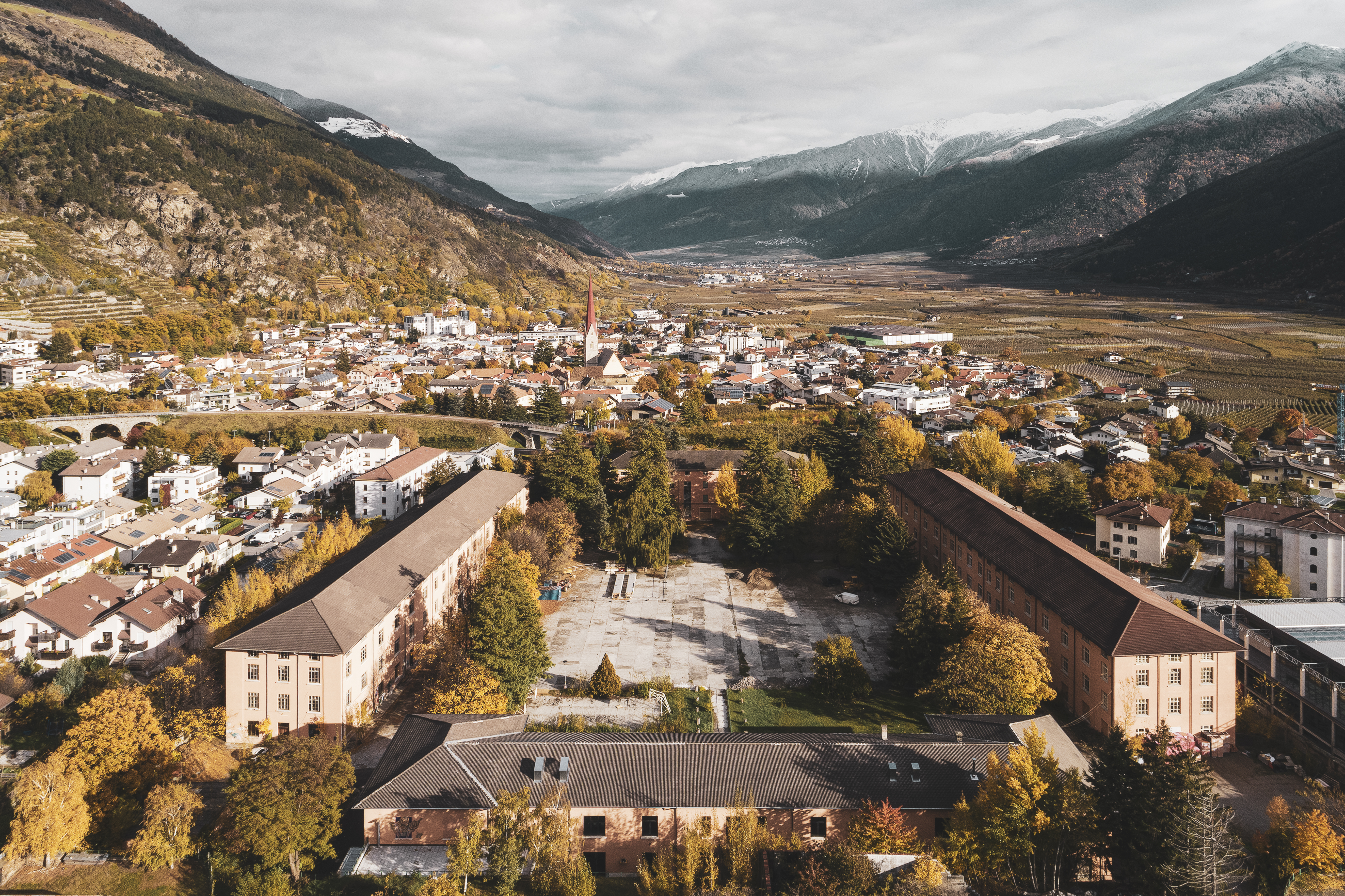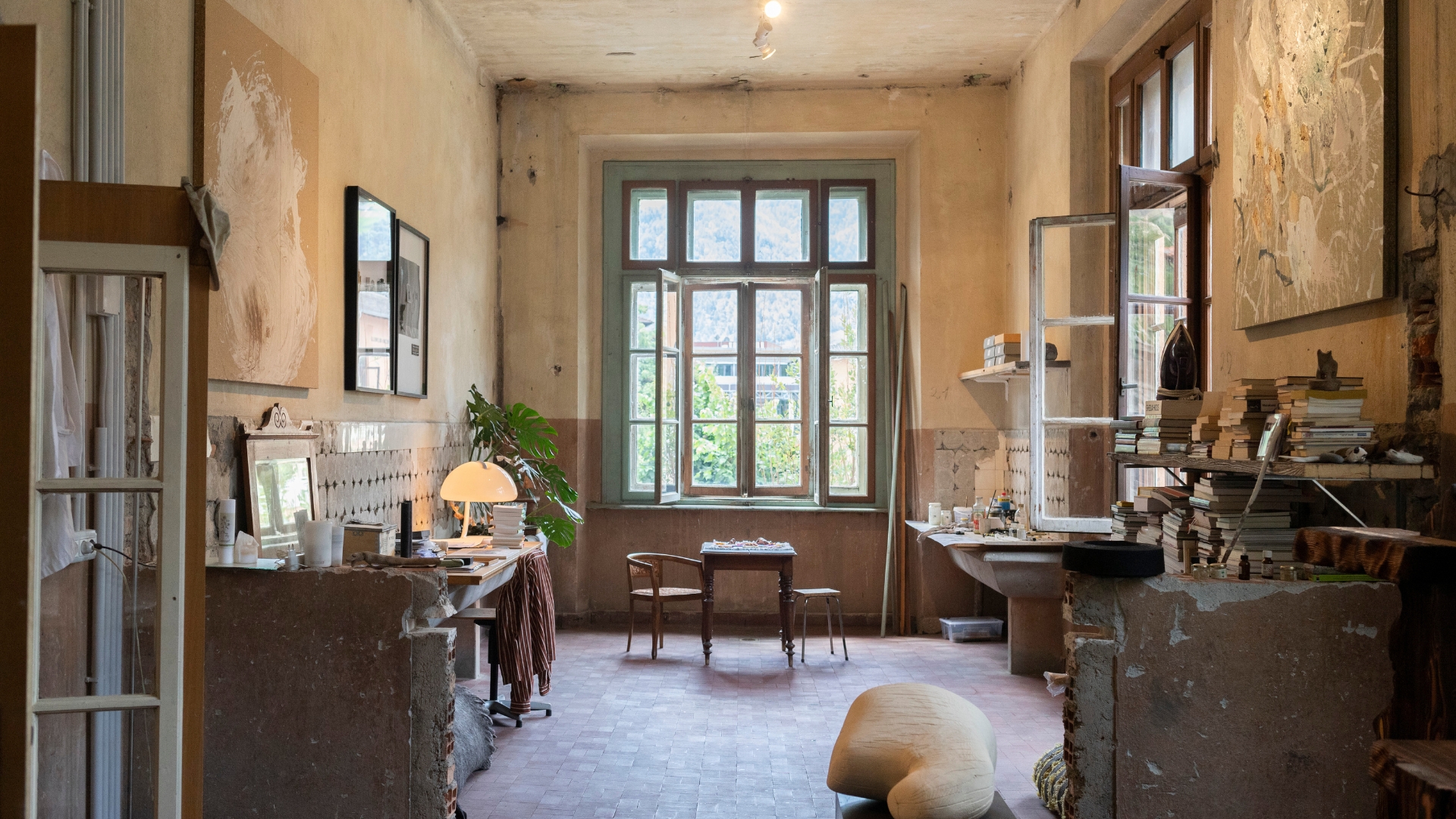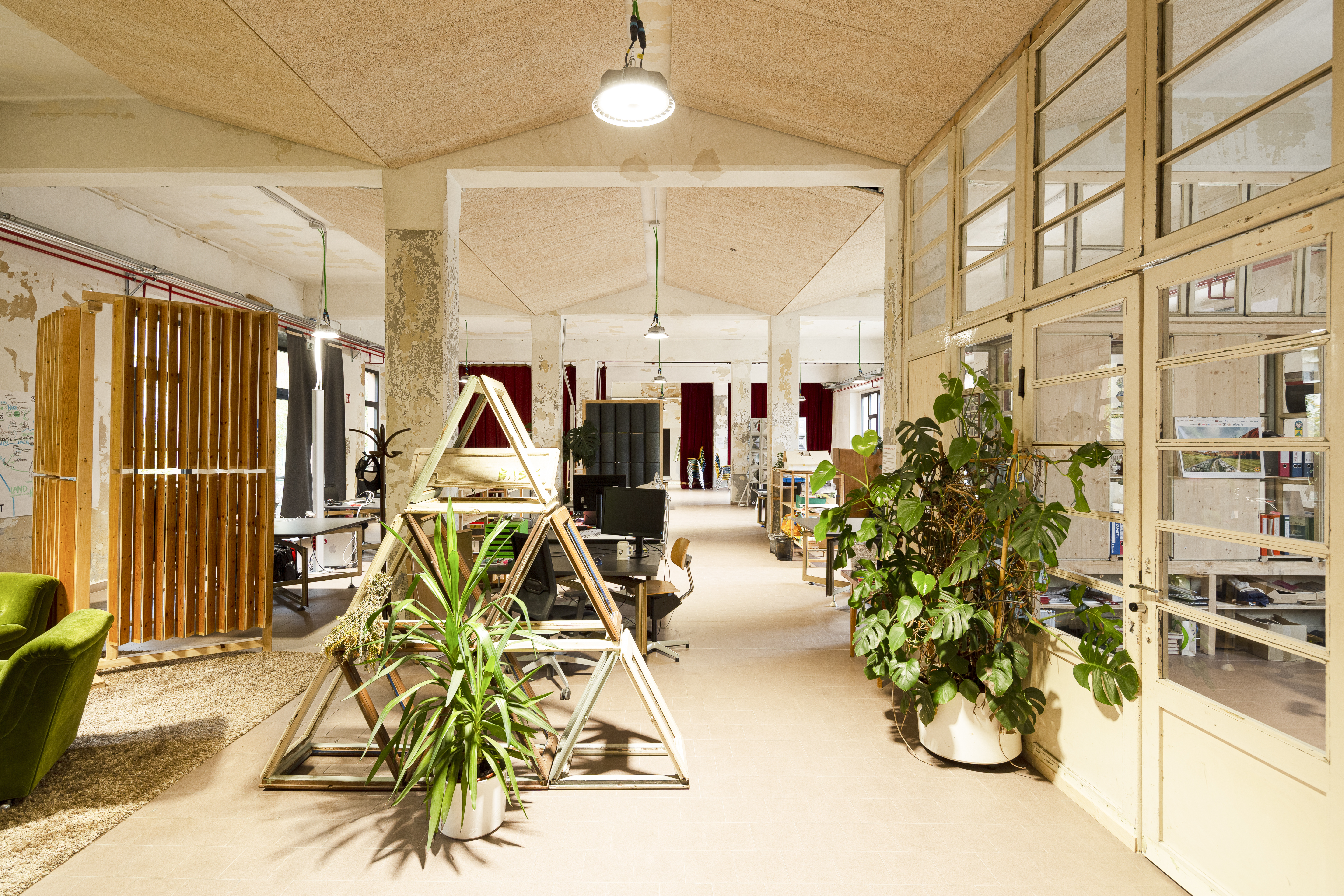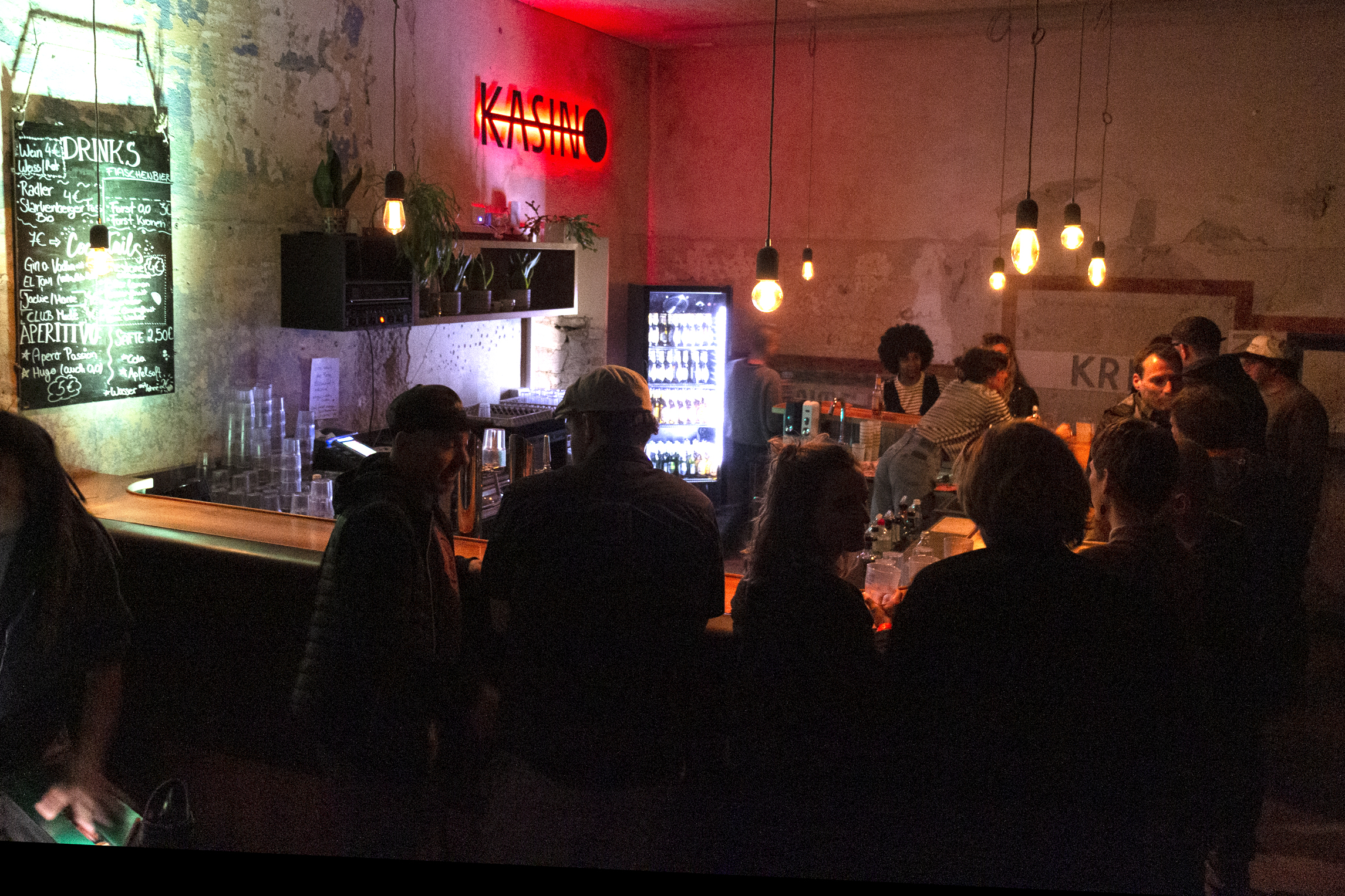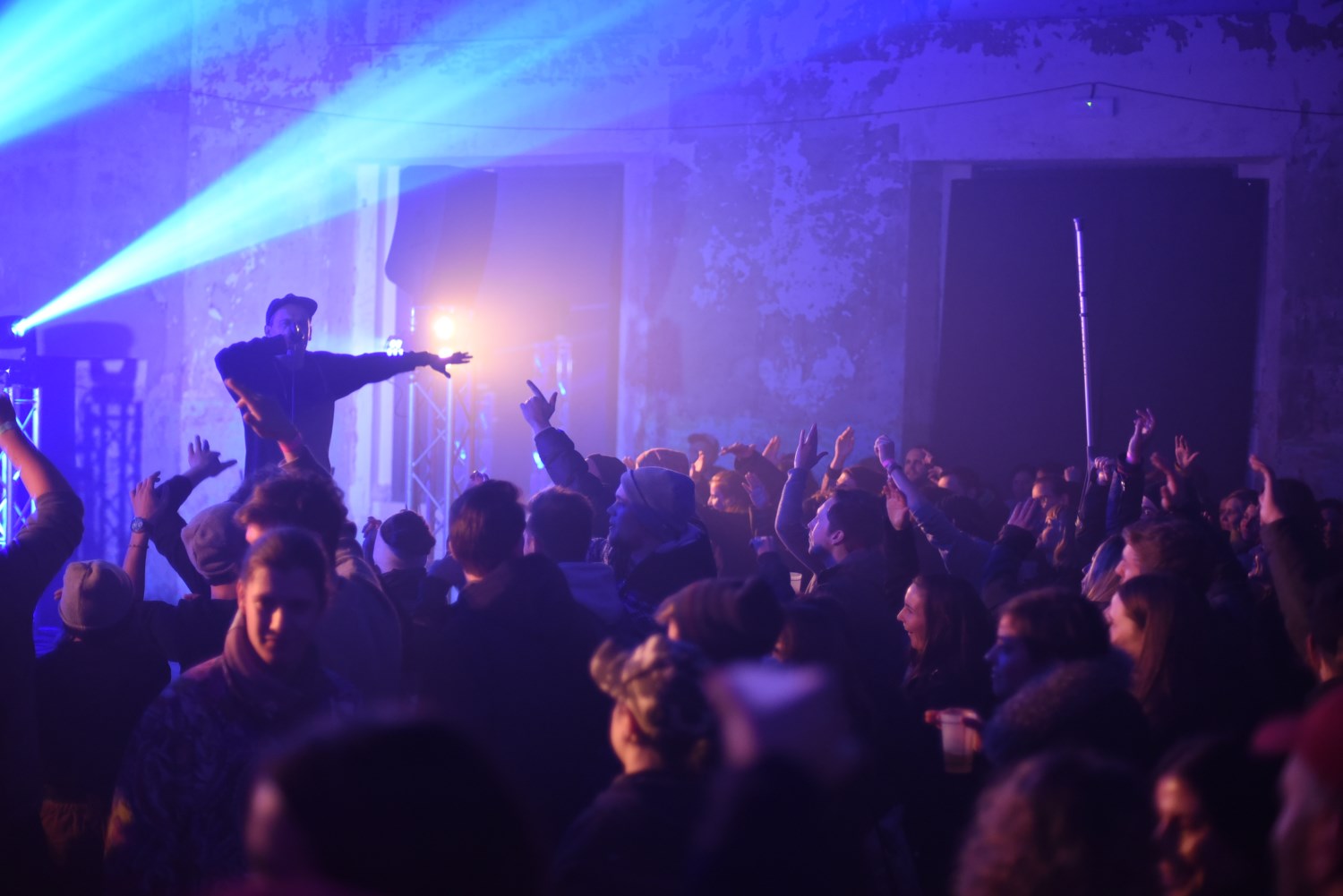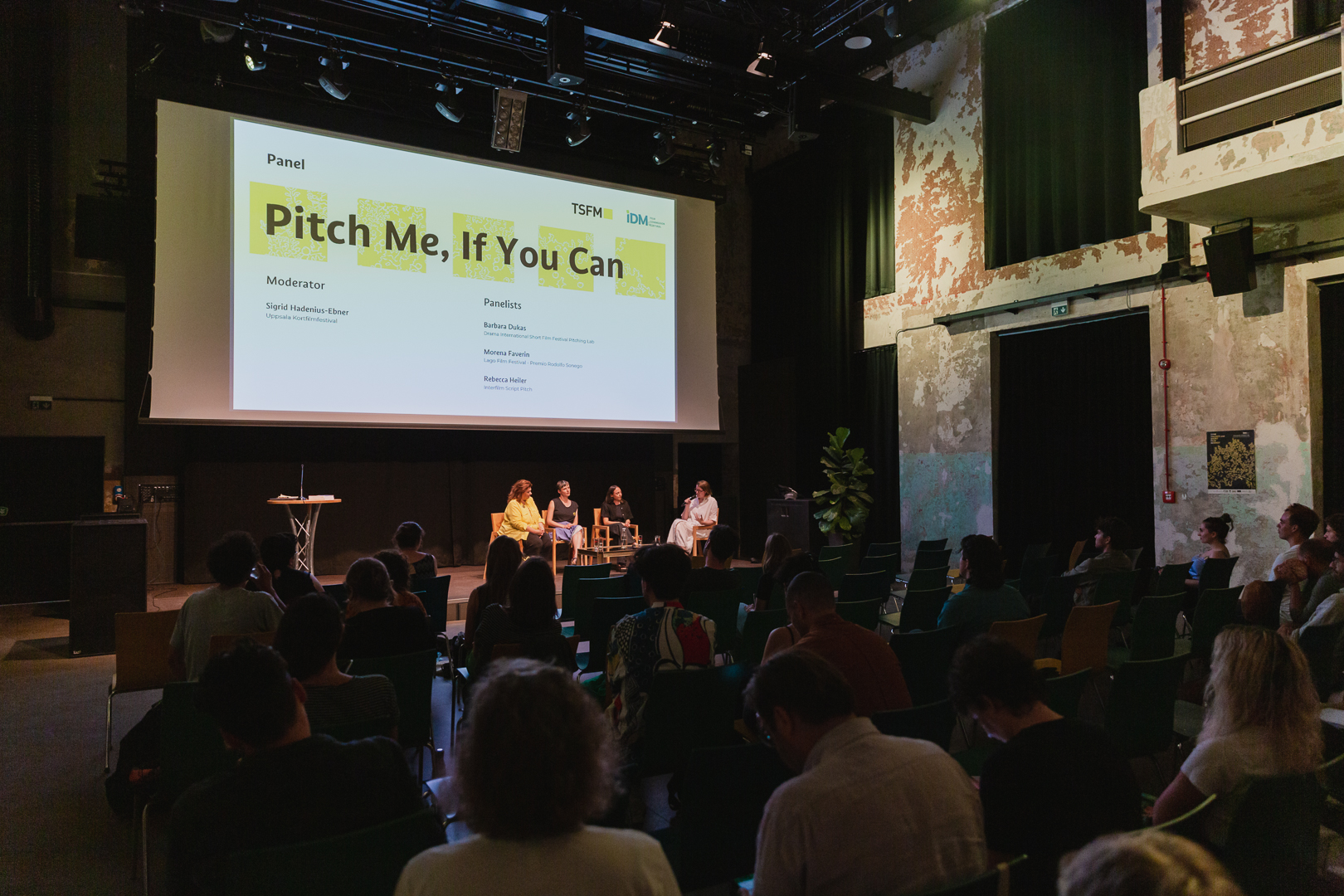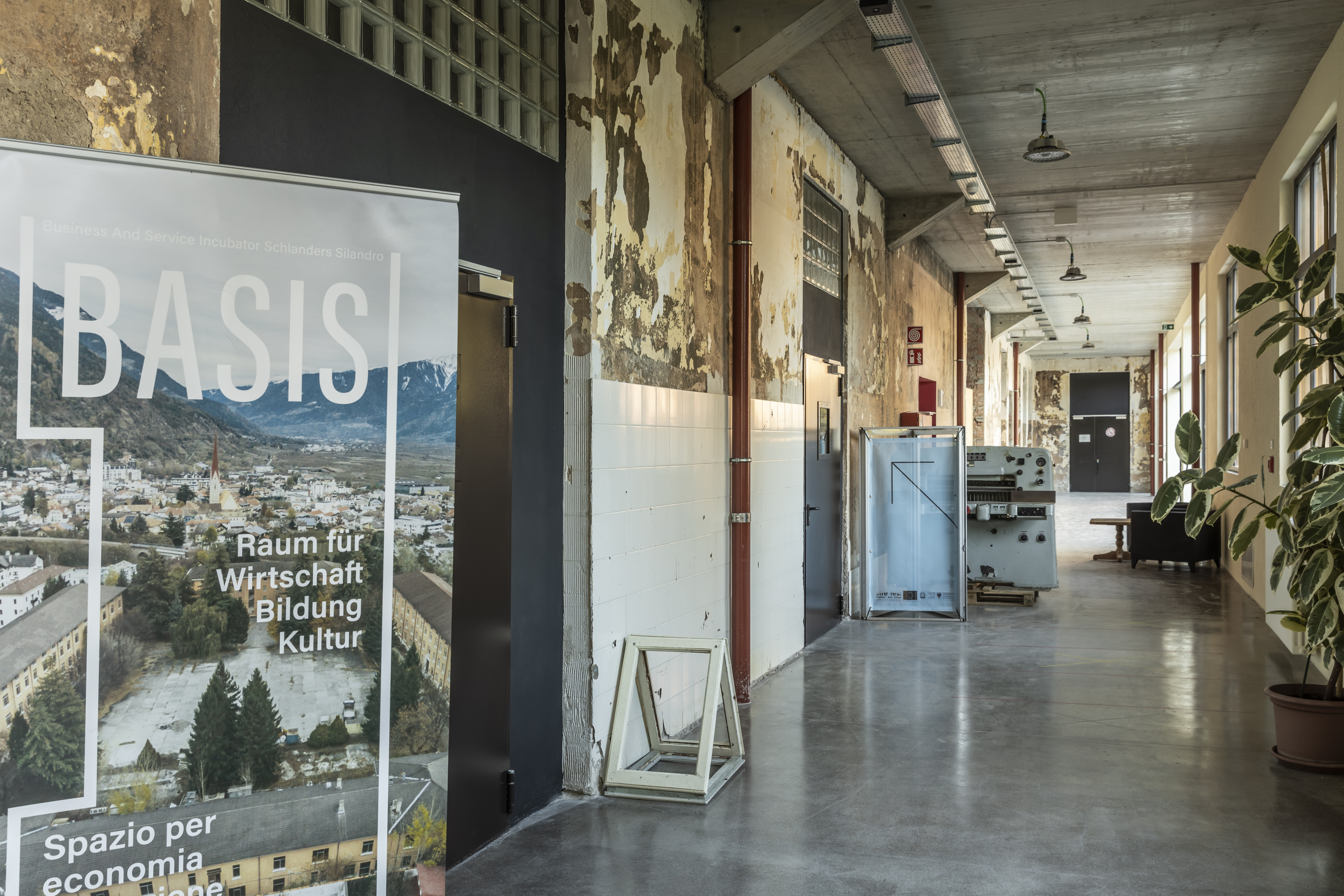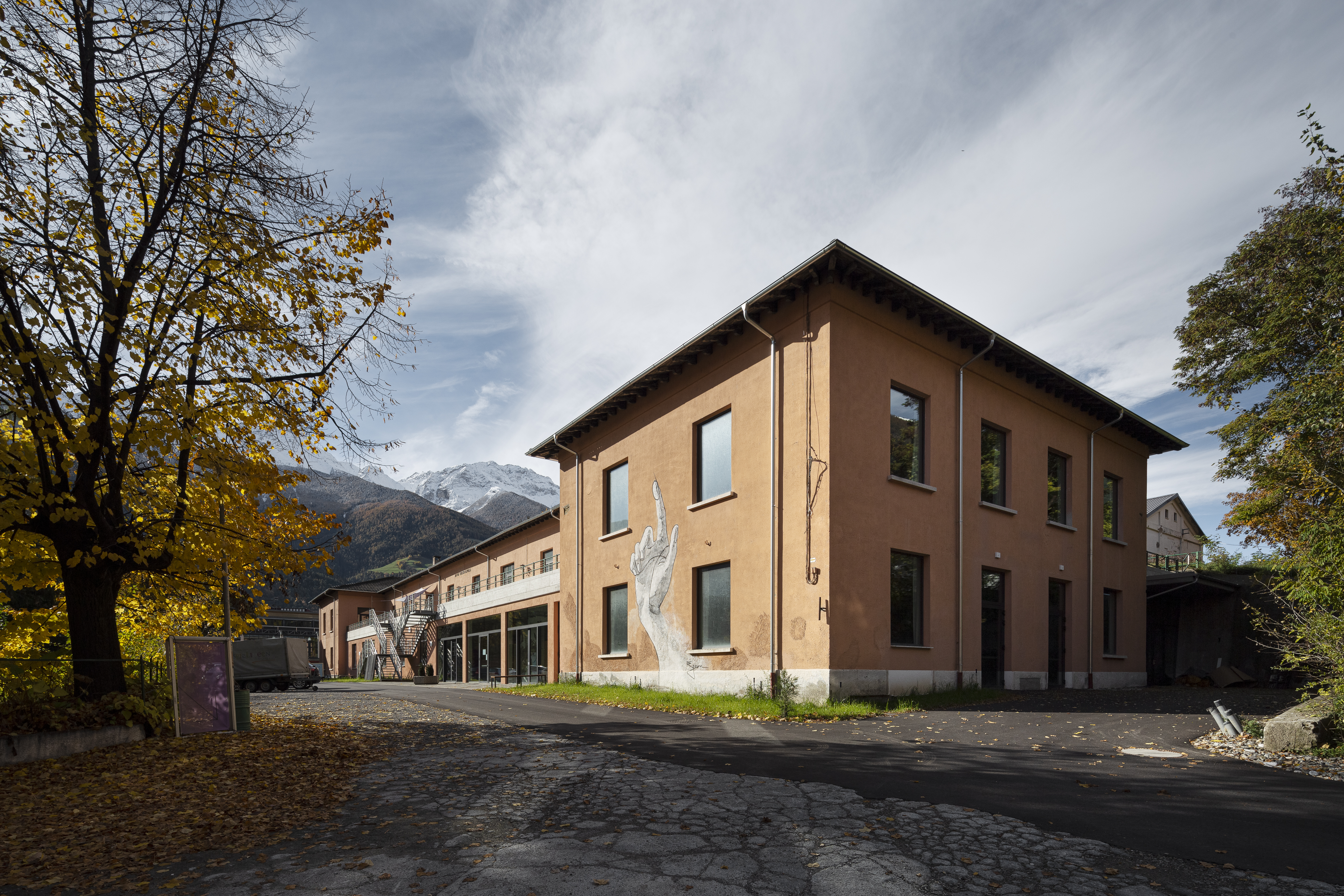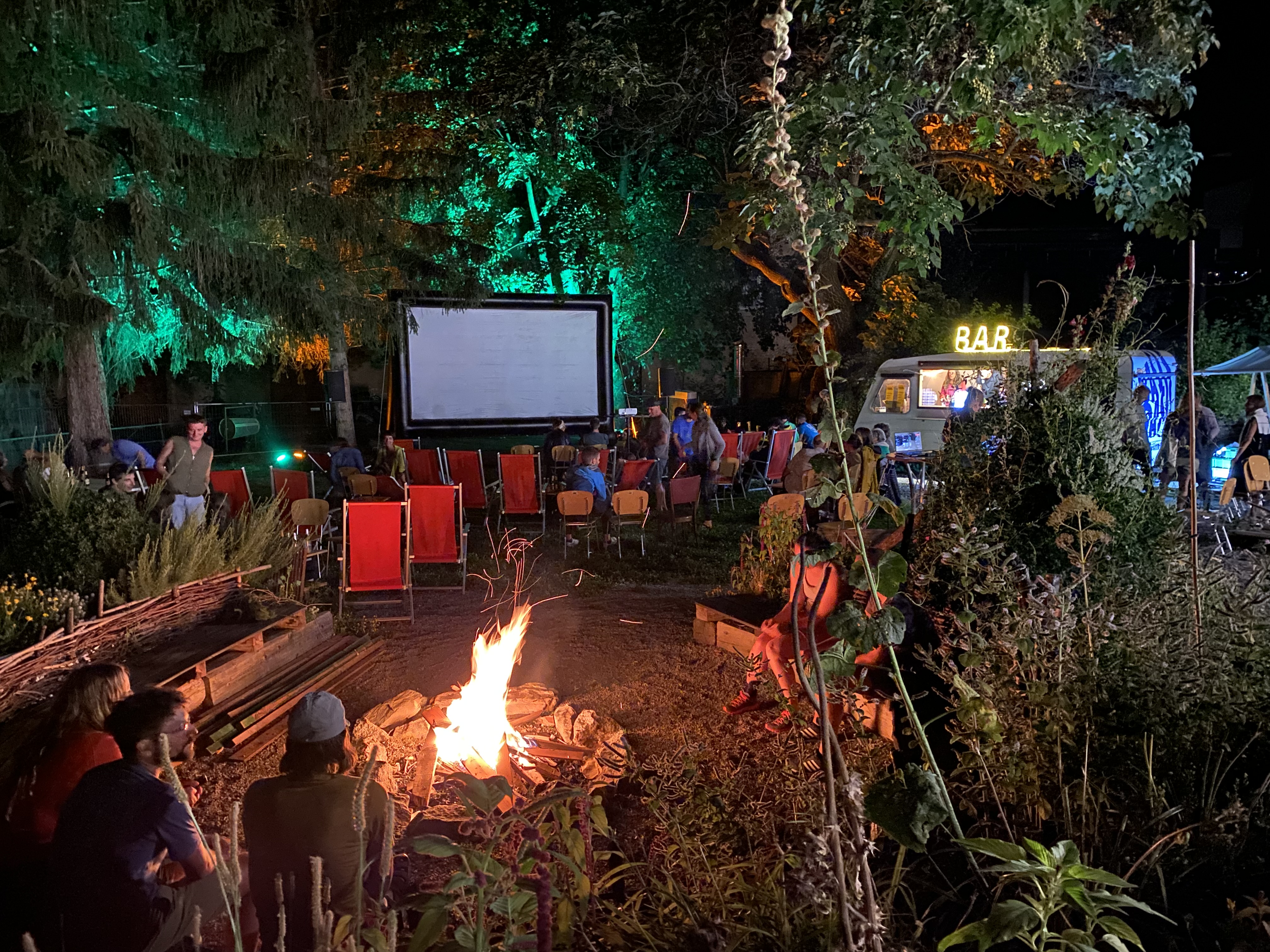Regaining a sense of belonging
BASIS
BASIS Vinschgau Venosta: Transformation of Former Fascist Barracks into a social activation hub
The project BASIS redefines rural development by fostering social cohesion and celebrating cultural heritage while confronting uncomfortable history and South Tyrol’s past and showing how abandoned spaces can become beacons of belonging and inspiration for all. BASIS repurposes 2 former fascist barracks in Northern Italy into a vibrant cultural hub, blending history, sustainability, and community. It creates spaces for co-creation, arts, entrepreneurship, technology, and grassroots initiatives.
Italy
Regional
Disctrict of the Venosta Valley and the region of Trentino South Tyrol.
It addresses urban-rural linkages
It refers to a physical transformation of the built environment (hard investment)
Yes
2023-12-31
Yes
ERDF, Creative Europe, ESF, NEB Climate Kick Ignite Program
No
No
As a representative of an organisation
The project BASIS transformed abandoned Fascist-era barracks into a multidisciplinary hub for culture, social innovation, and economic activation in rural South Tyrol. Once a site of forced land expropriation (1937) and later military abandonment (1995-2015), the barracks have been reimagined since 2016 as an inclusive, sustainable, and community-driven space.
Through an initial EU funding and municipal support, one of four buildings was renovated between 2017-2019, preserving historical structures and local materials while integrating sustainable innovations. Today, BASIS offers a modular co-working and creative hub hosting: residencies, high-tech audiovisual production, cultural & musical events, ateliers and community-led initiatives
BASIS serves entrepreneurs, artists, researchers, creatives, and the local community, providing affordable, accessible spaces to co-create, experiment, and thrive. It fosters social inclusion, empowering young professionals, women, and marginalized groups through skills training, networking, and creative opportunities.
The project challenges uncomfortable historical narratives, sparking critical reflection on Fascist architecture and memory (as explored in 2024 diploma theses by Michael Rollman & Gina Braun). It has become a European model for adaptive reuse, merging cultural heritage with forward-thinking urban-rural innovation. This hub offers– beyond functional and social benefits – a place for sensory and emotional experiences.
As part of Lo Stato dei Luoghi, Trans Europe Halles, European Creative Hub Networks, RESET! Network, NEB of the Mountains, and EUSALP Action Group 3, BASIS is a recognized Inner Development Hub for South Tyrol, fostering transgenerational, cross-sectoral, and international collaboration. BASIS is a lighthouse project proving that forgotten places can become thriving, inclusive cultural and economic ecosystems—a true embodiment of the NEB vision
Through an initial EU funding and municipal support, one of four buildings was renovated between 2017-2019, preserving historical structures and local materials while integrating sustainable innovations. Today, BASIS offers a modular co-working and creative hub hosting: residencies, high-tech audiovisual production, cultural & musical events, ateliers and community-led initiatives
BASIS serves entrepreneurs, artists, researchers, creatives, and the local community, providing affordable, accessible spaces to co-create, experiment, and thrive. It fosters social inclusion, empowering young professionals, women, and marginalized groups through skills training, networking, and creative opportunities.
The project challenges uncomfortable historical narratives, sparking critical reflection on Fascist architecture and memory (as explored in 2024 diploma theses by Michael Rollman & Gina Braun). It has become a European model for adaptive reuse, merging cultural heritage with forward-thinking urban-rural innovation. This hub offers– beyond functional and social benefits – a place for sensory and emotional experiences.
As part of Lo Stato dei Luoghi, Trans Europe Halles, European Creative Hub Networks, RESET! Network, NEB of the Mountains, and EUSALP Action Group 3, BASIS is a recognized Inner Development Hub for South Tyrol, fostering transgenerational, cross-sectoral, and international collaboration. BASIS is a lighthouse project proving that forgotten places can become thriving, inclusive cultural and economic ecosystems—a true embodiment of the NEB vision
Adaptive Reuse
Social Activation
Cultural Regeneration
Transdisciplinarity
Sustainability
BASIS embodies sustainability, inclusivity, and aesthetic quality, transforming an abandoned military barracks into a thriving, eco-conscious hub, which integrates environmental, social, and economic sustainability with beauty. By preserving architectural heritage and blending it with modern, flexible, and human-centered design, BASIS creates aesthetic spaces that inspire, connect, and empower. The fusion of history, innovation, and nature makes BASIS a beacon of creative rural development, setting a standard for adaptive reuse across Europe.
SUSTAINABLE: From the outset, BASIS prioritized reuse over demolition, minimizing waste and emissions. The original structures and local materials were preserved and creatively upcycled (see Multiplo, 2019). Moreover, workshops and consultancy services actively support the district’s green transition, e.g. including a €4M green communities project (PNRR) written and managed by BASIS. Furthermore, an EU project (DUT-CoPed) that will support the energy-sustainable development of the hub is starting.
TOGETHER: BASIS fosters social inclusion and accessibility, providing a space where local citizens, creatives, and entrepreneurs collaborate across disciplines. Barrier-free design ensures accessibility, while programs empower marginalized groups. More than just a workspace, BASIS functions as a "third place", where intercultural dialogue, mutual respect, and intersectional inclusivity are fundamental. By embedding radical tolerance and shared responsibility, BASIS creates a living example of a socially inclusive, regenerative model.
RESILIENT: BASIS operates toward a self-sustaining financial model, covering ~50% of costs through rentals, services, and events, with additional funding from public grants and strategic partnerships. It supports local economies by promoting regional producers, startups, and creative industries, while pioneering impact investing for local businesses, ensuring sustainable economic benefits.
SUSTAINABLE: From the outset, BASIS prioritized reuse over demolition, minimizing waste and emissions. The original structures and local materials were preserved and creatively upcycled (see Multiplo, 2019). Moreover, workshops and consultancy services actively support the district’s green transition, e.g. including a €4M green communities project (PNRR) written and managed by BASIS. Furthermore, an EU project (DUT-CoPed) that will support the energy-sustainable development of the hub is starting.
TOGETHER: BASIS fosters social inclusion and accessibility, providing a space where local citizens, creatives, and entrepreneurs collaborate across disciplines. Barrier-free design ensures accessibility, while programs empower marginalized groups. More than just a workspace, BASIS functions as a "third place", where intercultural dialogue, mutual respect, and intersectional inclusivity are fundamental. By embedding radical tolerance and shared responsibility, BASIS creates a living example of a socially inclusive, regenerative model.
RESILIENT: BASIS operates toward a self-sustaining financial model, covering ~50% of costs through rentals, services, and events, with additional funding from public grants and strategic partnerships. It supports local economies by promoting regional producers, startups, and creative industries, while pioneering impact investing for local businesses, ensuring sustainable economic benefits.
BASIS transformed a former military barracks into a vibrant social innovation and creative hub, enhancing aesthetics and quality of experience through, service and experience led design and rich cultural programming. The project aimed to capitalize on the technical (structural substance in local stone) and functional aspects (large spaces typical of Rationalism architecture) and forestall the negative aspects linked to the historical baggage of the military area (expropriations, fascism). By preserving and repurposing existing buildings as contemporary, welcoming spaces, BASIS respects the past while fostering new narratives, making it a place of reflection and community.
Culturally, BASIS offers diverse artistic experience – exhibitions, workshops, concerts, and residencies – that engage local and international audiences. The design of flexible spaces encourages creativity and interaction, serving as a catalyst for social innovation. Public areas like the community garden and event spaces are designed to be inclusive and inviting, ensuring accessibility for all.
As an exemplary project, BASIS demonstrates how adaptive reuse can transform neglected spaces into cultural landmarks that enrich community life. By merging history with modern design and promoting cultural participation, BASIS sets a standard for creating inclusive, inspiring and adaptable environments that foster a sense of belonging.
BASIS now hosts a variety of multifunctional spaces, tailored to enhance cultural participation:
Residencies –accommodation for visiting artists, researchers…
Ateliers – Customizable spaces for artisans and makers
Creative Education Studio - fosters innovation and learning through arts (music & film) and new technologies
Event Spaces – Hosting concerts, performances, and conferences.
Co-working
Culinary Innovation Lab – Supporting local food production and gastronomic experiments
Community Garden – Green spaces for social connection and environmental awareness
Culturally, BASIS offers diverse artistic experience – exhibitions, workshops, concerts, and residencies – that engage local and international audiences. The design of flexible spaces encourages creativity and interaction, serving as a catalyst for social innovation. Public areas like the community garden and event spaces are designed to be inclusive and inviting, ensuring accessibility for all.
As an exemplary project, BASIS demonstrates how adaptive reuse can transform neglected spaces into cultural landmarks that enrich community life. By merging history with modern design and promoting cultural participation, BASIS sets a standard for creating inclusive, inspiring and adaptable environments that foster a sense of belonging.
BASIS now hosts a variety of multifunctional spaces, tailored to enhance cultural participation:
Residencies –accommodation for visiting artists, researchers…
Ateliers – Customizable spaces for artisans and makers
Creative Education Studio - fosters innovation and learning through arts (music & film) and new technologies
Event Spaces – Hosting concerts, performances, and conferences.
Co-working
Culinary Innovation Lab – Supporting local food production and gastronomic experiments
Community Garden – Green spaces for social connection and environmental awareness
The project BASIS champions inclusion by creating a space where diverse individuals and communities can connect, collaborate, and thrive. A true example of a third place. Events and spaces are intentionally affordable or free, without pressure to consume, ensuring broad community participation, regardless of socioeconomic status. From the technical point of view, all the spaces have been made accessible to people with disabilities.
Governance at BASIS reflects inclusivity through a bottom-up approach, involving local citizens, association members, and volunteers in decision-making. By blending cultural, economic, and social activities, BASIS fosters interdisciplinary collaboration and a “design for all” ethos. The hub is home to initiatives supporting marginalized groups, including workshops for people with disabilities. Through its diverse cultural program, which promotes cultural participation with target-group-specific formats (e.g., FAI Kasino for young initiatives, Faltenrock for older generations, etc.), BASIS reaches a broad audience. At the same time, it fosters intergenerational and cross-reality exchange, strengthening mutual understanding and supporting personal development within the local community.
Exemplifying a new societal model, BASIS transforms a historically exclusive place into a beacon of shared ownership, cultural exchange, and grassroots innovation. It sets a precedent for inclusive, community led design and governance in rural and urban contexts alike.
Governance at BASIS reflects inclusivity through a bottom-up approach, involving local citizens, association members, and volunteers in decision-making. By blending cultural, economic, and social activities, BASIS fosters interdisciplinary collaboration and a “design for all” ethos. The hub is home to initiatives supporting marginalized groups, including workshops for people with disabilities. Through its diverse cultural program, which promotes cultural participation with target-group-specific formats (e.g., FAI Kasino for young initiatives, Faltenrock for older generations, etc.), BASIS reaches a broad audience. At the same time, it fosters intergenerational and cross-reality exchange, strengthening mutual understanding and supporting personal development within the local community.
Exemplifying a new societal model, BASIS transforms a historically exclusive place into a beacon of shared ownership, cultural exchange, and grassroots innovation. It sets a precedent for inclusive, community led design and governance in rural and urban contexts alike.
Citizens and civil society play a central role in the BASIS Vinschgau Venosta project, contributing to its development, implementation, and ongoing success. From its inception, the project has been driven by a grassroots initiative that involved local citizens in repurposing the former military barracks. Community members were engaged in early discussions, workshops, and Community meetups planning processes to envision the hub’s future.
BASIS empowers individuals to take ownership of the space by offering affordable, adaptable venues for events, co-working, and artistic projects. Leading with trust and openness, the association fosters self-activation and social empowerment. Regular community events, such as open-air music, cultural festivals, and repair cafés, actively involve citizens in shaping the hub’s activities. Additionally, partnerships with local organizations and schools have fostered intergenerational learning and participation. BASIS integrates a sustainable volunteer system that does not exploit volunteers but instead places them at the heart of the organization, where they can not only contribute creatively but also actively shape the region’s future and engage in socio-political action. This involvement has strengthened community cohesion, fostered trust, and ensured that BASIS reflects the diverse needs of the region. Citizens’ input has enriched its design and programming, making it a model of participatory development and inclusive governance.
BASIS empowers individuals to take ownership of the space by offering affordable, adaptable venues for events, co-working, and artistic projects. Leading with trust and openness, the association fosters self-activation and social empowerment. Regular community events, such as open-air music, cultural festivals, and repair cafés, actively involve citizens in shaping the hub’s activities. Additionally, partnerships with local organizations and schools have fostered intergenerational learning and participation. BASIS integrates a sustainable volunteer system that does not exploit volunteers but instead places them at the heart of the organization, where they can not only contribute creatively but also actively shape the region’s future and engage in socio-political action. This involvement has strengthened community cohesion, fostered trust, and ensured that BASIS reflects the diverse needs of the region. Citizens’ input has enriched its design and programming, making it a model of participatory development and inclusive governance.
Local Level: The idea itself raised from private citizens idea, who teamed up with the municipality of Silandro collaborated to envision the reuse of the former military areal. Local volunteers and organizations actively participated in the co-creation process, community engagement initiatives, and ongoing programming. Their input ensured that BASIS meets local needs and reflects the region's identity.
Regional Level: The Autonomous Province of Bolzano and regional development and research institutions (University of Bolzano, NOI Techpark…) support BASIS and collaborate in synergy. Partnerships with schools, cultural groups, and local producers further strengthened BASIS’s integration into regional development strategies. Furthermore, BASIS is actively involved in numerous regional networks, such as Allianz der Kultur and PERFAS.
National Level: National cultural organizations and networks, such as Lo Stato dei Luoghi, provided advisory support for key projects, helping BASIS position itself as a national model for adaptive reuse and cultural innovation.
European Level: BASIS as an active member, leveraged its role in European networks like EUSALP, Trans Europe Halles, RESET! and European Creative Hubs Network to share best practices, secure funding, and build international collaborations. These networks brought expertise, visibility, and cross-border inspiration. Since 2025 BASIS is also an official NEB partner.
The multi-level collaboration added value by ensuring financial sustainability, enhancing cultural exchange, and positioning BASIS as a replicable model for social and cultural innovation in Europe.
Regional Level: The Autonomous Province of Bolzano and regional development and research institutions (University of Bolzano, NOI Techpark…) support BASIS and collaborate in synergy. Partnerships with schools, cultural groups, and local producers further strengthened BASIS’s integration into regional development strategies. Furthermore, BASIS is actively involved in numerous regional networks, such as Allianz der Kultur and PERFAS.
National Level: National cultural organizations and networks, such as Lo Stato dei Luoghi, provided advisory support for key projects, helping BASIS position itself as a national model for adaptive reuse and cultural innovation.
European Level: BASIS as an active member, leveraged its role in European networks like EUSALP, Trans Europe Halles, RESET! and European Creative Hubs Network to share best practices, secure funding, and build international collaborations. These networks brought expertise, visibility, and cross-border inspiration. Since 2025 BASIS is also an official NEB partner.
The multi-level collaboration added value by ensuring financial sustainability, enhancing cultural exchange, and positioning BASIS as a replicable model for social and cultural innovation in Europe.
The design and implementation of BASIS Vinschgau Venosta integrated multiple disciplines and knowledge fields, fostering a truly interdisciplinary approach:
Architecture and Urban Planning: Adaptive reuse of the military areal reflected expertise in sustainable design, circular economy principles, and heritage preservation. The Hub BASIS is one piece of the future urban development of the total 4 hectares site that will include housing, business area and the extension of the adjacent school centre, becoming a hub of social development where work and leisure meet.
Arts and Culture: Artists, designers, and cultural producers were central in shaping BASIS as a creative hub, creating spaces for exhibitions, performances, and collaborative projects. The BASIS team invested great effort in curatorship to create a balance between international guests and formats, while at the same time providing and giving a stage for young local initiatives.
Economic Development: To foster innovation and entrepreneurship the project collaborates from the beginning with research institutions and local service providers. It aims to bring global trends and innovations to the rural area of the Venosta Valley. This is done through formats organised with research centres such as the University of Bolzano, EURAC and Fraunhofer Institute, as well as local innovation providers NOI Techpark and IDM.
Interaction among disciplines occurred through workshops, planning sessions, and stakeholder dialogues, fostering mutual learning and co-creation. This interdisciplinary collaboration enriched the project by merging technical precision with creative vision, resulting in a dynamic, multifunctional space that is both sustainable and socially impactful.
Architecture and Urban Planning: Adaptive reuse of the military areal reflected expertise in sustainable design, circular economy principles, and heritage preservation. The Hub BASIS is one piece of the future urban development of the total 4 hectares site that will include housing, business area and the extension of the adjacent school centre, becoming a hub of social development where work and leisure meet.
Arts and Culture: Artists, designers, and cultural producers were central in shaping BASIS as a creative hub, creating spaces for exhibitions, performances, and collaborative projects. The BASIS team invested great effort in curatorship to create a balance between international guests and formats, while at the same time providing and giving a stage for young local initiatives.
Economic Development: To foster innovation and entrepreneurship the project collaborates from the beginning with research institutions and local service providers. It aims to bring global trends and innovations to the rural area of the Venosta Valley. This is done through formats organised with research centres such as the University of Bolzano, EURAC and Fraunhofer Institute, as well as local innovation providers NOI Techpark and IDM.
Interaction among disciplines occurred through workshops, planning sessions, and stakeholder dialogues, fostering mutual learning and co-creation. This interdisciplinary collaboration enriched the project by merging technical precision with creative vision, resulting in a dynamic, multifunctional space that is both sustainable and socially impactful.
BASIS Vinschgau Venosta stands out as an innovative project by transforming a former military barracks – a symbol of exclusion and dissonant heritage – into an inclusive cultural hub, merging sustainability, social impact, and regional development. South Tyrol’s history is deeply marked by WWI and WWII, shaping the region’s identity, governance, and built environment. Annexed to Italy in 1919 under the Treaty of Saint-Germain, South Tyrol faced forced Italianization under Fascist rule, including the construction of military infrastructure on expropriated land such as the Drusus Barracks in 1937. These barracks became a symbol of oppression and cultural erasure for the local population. By reclaiming and repurposing this space, BASIS directly engages with South Tyrol’s complex historical legacy, transforming a site of military control into one of civic empowerment, creativity, and inclusivity. Hence, unlike mainstream approaches that often demolish or privatize abandoned sites, BASIS embraced public ownership, adaptive reuse, leveraging circular economy principles and upcycling materials to preserve history while fostering innovation.
Its creation of a third space in a rural Alpine context is groundbreaking, introducing urban-like cultural and economic vibrancy to a region typically focused on agriculture and tourism. BASIS integrates interdisciplinary activities art, culture, technology, education and entrepreneurship under one roof, creating a prototype for rural-urban synergies .
The project’s bottom-up governance model, which actively involves citizens and stakeholders in design and decision-making, contrasts with traditional top-down redevelopment projects which often lead to the construction of white elephants.
Its creation of a third space in a rural Alpine context is groundbreaking, introducing urban-like cultural and economic vibrancy to a region typically focused on agriculture and tourism. BASIS integrates interdisciplinary activities art, culture, technology, education and entrepreneurship under one roof, creating a prototype for rural-urban synergies .
The project’s bottom-up governance model, which actively involves citizens and stakeholders in design and decision-making, contrasts with traditional top-down redevelopment projects which often lead to the construction of white elephants.
The approach behind the project is based on a bottom-up participatory methodologies. The vision behind the project originated in 2015, through the innovative foresight of a private citizen (Hannes Götsch, current CEO of BASIS) and the trust of a public administrator (Dieter Pinggera, then Mayor of Silandro), which enabled the development of a collective process of regeneration of the former barracks. So, in 2017, the renovation of the former supply building, “Palazzina Servizi”, by the municipality of Silandro started, ending in 2019 with the creation of the association BASIS Vinschgau Venosta and the signing of a rental agreement with the municipality for 30 years. The project evolved step-by-step, addressing urgent needs like space activation first, hence in 2021 started a maintenance occupation of a further building in the areal which led to a further rental agreement in summer 2024 and the initiation of a new reuse project: Kreativwerkstatt (from German Creative Workshops, i.e. ateliers and production rooms for craft and handicraft).
Overall, BASIS has created a discontinuity in thinking about culturally based development in the valley, opening a place for creativity, experimentation and contemporary working methods, thus motivating the community to openly share their needs, and actively shape its own social and economic space. The mission of BASIS is indeed the regional and social development in the fields of economy, culture and education, pursued by promoting processes of social innovation and empowerment of skills.
Overall, BASIS has created a discontinuity in thinking about culturally based development in the valley, opening a place for creativity, experimentation and contemporary working methods, thus motivating the community to openly share their needs, and actively shape its own social and economic space. The mission of BASIS is indeed the regional and social development in the fields of economy, culture and education, pursued by promoting processes of social innovation and empowerment of skills.
The project BASIS utilized a participatory and interdisciplinary methodology that prioritized diversity, inclusivity, sustainability, and community empowerment:
Adaptive Reuse and Circular Economy Principles: The project began with the decision to repurpose a former military building instead of demolishing it. This minimized environmental impact, preserved historical integrity, and aligned with SDGs. BASIS wants to become a replicable prototype on a national/ international scale. According to the most up-to-date data of the Agenzia del Demanio (2015), there are about 1,500 disused barracks in Italy alone, plus innumerable abandoned production sites. A utopian but tangible vision, where instead of demolishing and economically exploiting buildings with difficult emotional burdens (expropriations, exploitations, compulsory conscription, the spectre of occupation...) these are rethought and opened to the public, creating new models of shared use. At the provincial level, BASIS has already started consultancy processes for the municipalities of Bolzano, Merano and Bressanone where municipalities own former barracks and questions of how to develop these sites.
Participatory Design: Local citizens, stakeholders, and community organizations were engaged in workshops, surveys, and planning sessions to co-create the vision and shape the design; this ensured alignment with the community's needs.
Interdisciplinary Collaboration: Experts in architecture, urban planning, social sciences, cultural management, and environmental sustainability worked together to enable the creation of multifunctional spaces that serve as a hub for creativity, innovation, and community activities.
Integration of Cultural Narratives: The project incorporated local history and cultural identity into its design and programming, creating a sense of belonging while addressing the region’s contemporary challenges
Adaptive Reuse and Circular Economy Principles: The project began with the decision to repurpose a former military building instead of demolishing it. This minimized environmental impact, preserved historical integrity, and aligned with SDGs. BASIS wants to become a replicable prototype on a national/ international scale. According to the most up-to-date data of the Agenzia del Demanio (2015), there are about 1,500 disused barracks in Italy alone, plus innumerable abandoned production sites. A utopian but tangible vision, where instead of demolishing and economically exploiting buildings with difficult emotional burdens (expropriations, exploitations, compulsory conscription, the spectre of occupation...) these are rethought and opened to the public, creating new models of shared use. At the provincial level, BASIS has already started consultancy processes for the municipalities of Bolzano, Merano and Bressanone where municipalities own former barracks and questions of how to develop these sites.
Participatory Design: Local citizens, stakeholders, and community organizations were engaged in workshops, surveys, and planning sessions to co-create the vision and shape the design; this ensured alignment with the community's needs.
Interdisciplinary Collaboration: Experts in architecture, urban planning, social sciences, cultural management, and environmental sustainability worked together to enable the creation of multifunctional spaces that serve as a hub for creativity, innovation, and community activities.
Integration of Cultural Narratives: The project incorporated local history and cultural identity into its design and programming, creating a sense of belonging while addressing the region’s contemporary challenges
Urban-Rural Disparity: Rural areas often face depopulation, limited opportunities, and economic stagnation. BASIS tackles this by transforming a disused military barracks into a vibrant hub that combines culture, entrepreneurship, and community-building, revitalizing the local economy and making the region more attractive to young people and professionals. Despite South Tyrol being one of the richest regions in the Alps, the district of the Venosta Valley is relatively poor, facing emigration. Here there is mainly the younger generation moving to bigger cities (e.g. Innsbruck, Munich, Vienna). The BASIS project creates new possibilities for peripheral realities that can be replicated in other inner European areas. This will make it possible in the long term to maintain and grow a dynamic and agile segment of the population with important future feedback on the economic development of the regions.
Sustainability in urban development: By repurposing existing structures rather than demolishing them, BASIS significantly reduces construction waste and carbon emissions. Its use of upcycled materials and energy-efficient systems reflects a commitment to the circular economy and environmental responsibility.
Fragmented Societies: In a time of increasing polarization, BASIS promotes intercultural dialogue and interdisciplinary collaboration, bringing together people from various backgrounds under one roof to share knowledge, experiences, and creative ideas. Moreover, BASIS aims to reduce bureaucratic barriers and replace the "no-because" mindset with a "yes-if" approach, encouraging innovative creation. This is done by giving space to new initiatives which do not fit in other “mainstream” contexts. This empowers youth to take ownership of cultural initiatives, providing both creative freedom and practical skills through a learn-by-doing approach, often missing in traditional education systems. In turn, it also fosters placemaking and empowerment.
Sustainability in urban development: By repurposing existing structures rather than demolishing them, BASIS significantly reduces construction waste and carbon emissions. Its use of upcycled materials and energy-efficient systems reflects a commitment to the circular economy and environmental responsibility.
Fragmented Societies: In a time of increasing polarization, BASIS promotes intercultural dialogue and interdisciplinary collaboration, bringing together people from various backgrounds under one roof to share knowledge, experiences, and creative ideas. Moreover, BASIS aims to reduce bureaucratic barriers and replace the "no-because" mindset with a "yes-if" approach, encouraging innovative creation. This is done by giving space to new initiatives which do not fit in other “mainstream” contexts. This empowers youth to take ownership of cultural initiatives, providing both creative freedom and practical skills through a learn-by-doing approach, often missing in traditional education systems. In turn, it also fosters placemaking and empowerment.
BASIS successfully transformed a disused military barracks into a vibrant community hub, reclaiming the space for public use and fostering a strong connection between the site and the local population. On the social level BASIS has hosted numerous workshops, cultural events, and programs that engage diverse groups, including marginalized and underrepresented communities, fostering social cohesion and participation.
From the economic point of view, the project BASIS managed to provide spaces for co-working, entrepreneurship, and cultural industries, BASIS has supported local businesses, start-ups, and creative professionals, contributing to regional economic development. Since 2019 coworking alone has hosted 176 people. In the same period 44 conferences were organized, welcoming a total of 17.000 participants. Through the innovation services offered for municipalities and companies BASIS managed to gain over 6 million in public funding for innovative green projects within the valley.
On the cultural side, over 400 artists have been invited for the different formats. 28 Ateliers have been built and are available for artisans and handicrafts up to now over 30 people have already used this opportunity.
BASIS serves as a cultural and economic hub, drawing visitors and creating a ripple effect on regional businesses, tourism, and cultural visibility. Through the events the project BASIS managed to increase the touristic flow in the valley.
The project has positioned itself as a model for community-driven, sustainable redevelopment, addressing challenges like rural depopulation, disconnection, and loss of cultural heritage. Its success resonates beyond its immediate context, offering scalable lessons for Europe and beyond.
From the economic point of view, the project BASIS managed to provide spaces for co-working, entrepreneurship, and cultural industries, BASIS has supported local businesses, start-ups, and creative professionals, contributing to regional economic development. Since 2019 coworking alone has hosted 176 people. In the same period 44 conferences were organized, welcoming a total of 17.000 participants. Through the innovation services offered for municipalities and companies BASIS managed to gain over 6 million in public funding for innovative green projects within the valley.
On the cultural side, over 400 artists have been invited for the different formats. 28 Ateliers have been built and are available for artisans and handicrafts up to now over 30 people have already used this opportunity.
BASIS serves as a cultural and economic hub, drawing visitors and creating a ripple effect on regional businesses, tourism, and cultural visibility. Through the events the project BASIS managed to increase the touristic flow in the valley.
The project has positioned itself as a model for community-driven, sustainable redevelopment, addressing challenges like rural depopulation, disconnection, and loss of cultural heritage. Its success resonates beyond its immediate context, offering scalable lessons for Europe and beyond.

